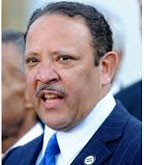
To Be Equal
Sotomayor: A voice of reason among reckless rhetoric
By Marc H. Morial NNPA Columnist
“Race matters… because of the long history of racial minorities being denied access to the political process… because of persistent racial inequality in society — inequality that cannot be ignored and that has produced stark socioeconomic disparities.”
– Justice Sonia Sotomayor, Supreme Court of the United States.
Two weeks ago, in a disturbingly lopsided 6-2 vote, the United States Supreme Court once again became a willing accomplice in the recent onslaught of attacks on 50 years of civil rights progress. On the heels of last year’s decision by the court to dismantle the Voting Rights Act of 1965, on April 22, the Court ruled that Michigan voters had the right to ban race, i.e. affirmative action, as a factor in college admissions. The court’s decision undermines a landmark 2003 ruling that affirmed the use of race-sensitive admissions policies at the University of Michigan Law School because of a compelling interest in fostering diversity in higher education.
In 2006, opponents of that ruling successfully campaigned and passed Proposal 2, a state constitutional amendment that gave voters the right to supersede elected university trustees and the right to ban the consideration of race as one of many factors in admissions. It is important to note that only race was singled out for the ban. Other factors, such as alumni status, athletics and geography remain in place. A federal appeals court subsequently ruled Prop 2 unconstitutional as it violated the Equal Protection clause of the Fourteenth Amendment. The case made its way to the Supreme Court, and the egregious decision in Schuette v. Coalition to Defend Affirmative Action, the 2006 amendment was allowed to stand.
Justice Anthony Kennedy was joined by Chief Justice Roberts and Justices Alito, Scalia, Thomas and Breyer in concurring in the judgment. Having worked on the case when she was Solicitor General, Justice Kagan recused herself. The two dissenting votes were cast by Justices Ginsberg and Sotomayor, the court’s most reliable civil rights defenders. Justice Sotomayor’s written dissent is an exceptionally scholarly, eloquent and impassioned argument in defense of affirmative action. She methodically eviscerates the majority’s legal justification for its decision, citing several previous cases where the court overturned attempts to change rules midstream in ways that were detrimental to minority voters. She also reminds the court of its obligation to right historical wrongs and to expand educational opportunities for those who have traditionally been locked out.
Her dissent is based primarily on the court’s untenable allowance of a change of rules that nullify the authority of elected University governing boards and now permit a majority of voters to end affirmative action in higher education – a clear violation of the Equal Protection Clause. Justice Sotomayor writes, “… a majority may not reconfigure the existing political process in a manner that creates a two-tiered system of political change, subjecting laws designed to protect or benefit discrete and insular minorities to a more burdensome political process than all other laws.”
Mindful of Michigan’s shameful history of segregation in higher education and of a significant decline in minority enrollment and graduations since Prop 2 took effect, Sotomayor concludes, “The effect of [the Court’s ruling] is that a white graduate of a public Michigan university who wishes to pass his historical privilege on to his children may freely lobby the board of that university in favor of an expanded legacy admissions policy, whereas a black Michigander who was denied the opportunity to attend that very university cannot lobby the board in favor of a policy that might give his children a chance that he never had and that they might never have absent that policy.”
We may have lost this battle for affirmative action, but as long as there are voices as clear and strong as Sonia Sotomayor’s on the Supreme Court, we are confident that in the end, equal opportunity, equal protection and equal justice will prevail.
Nonetheless, six other justices clearly demonstrated that our fight for civil rights is still not over – even in 21st century America. It is an unfortunate commentary on the direction of our nation when the highest court of our land determines that it is acceptable to consider factors that have seldom – if ever – been used as a basis for discrimination, such as legacy, athletics and geography in admissions, but not race. As Justice Sotomayor reminded her colleagues, “As members of the judiciary tasked with intervening to carry out the guarantee of equal protection, we ought not sit back and wish away, rather than confront, the racial inequality that exists in our society.”
